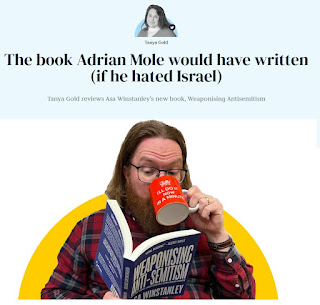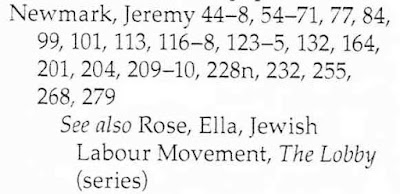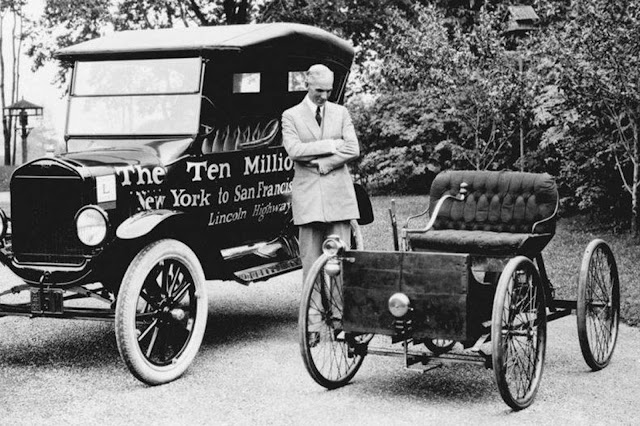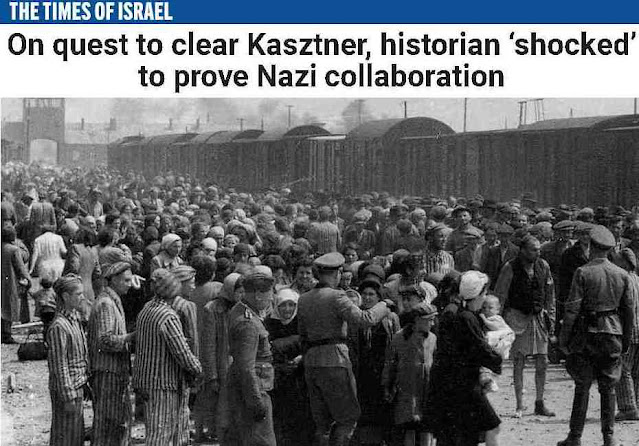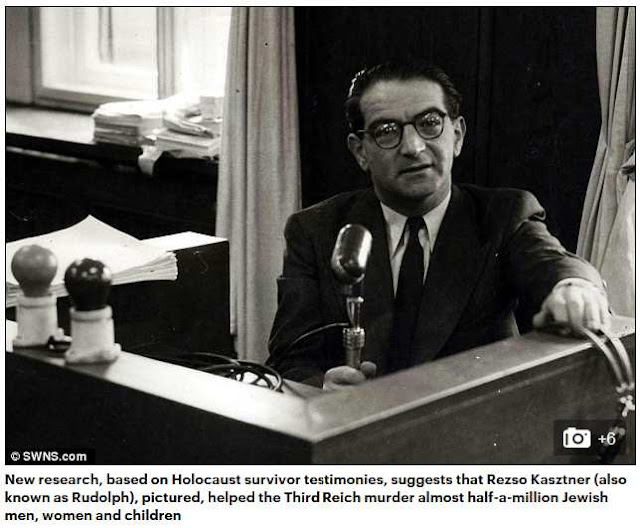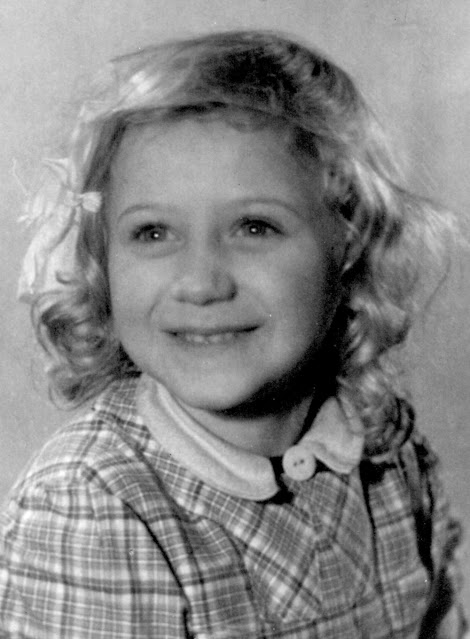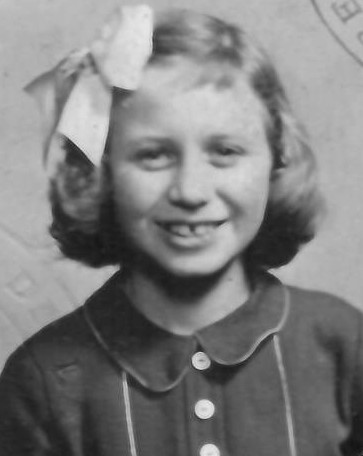Piglet ‘reviewed’ Asa Winstanley’s ‘Weaponising Anti-Semitism’
for the Jewish Chronicle – It would have helped if she had read it first!
Moshe Yalon - "Mein Kampf," reversed and Jewish Supremacy ideology infiltrated the government
I first came across Tanya Gold when Jackie Walker, the Black-Jewish activist who was expelled from the Labour Party, mentioned that there was a journalist who was interested in interviewing Jewish anti-Zionists for Harper’s Magazine and she wanted to put our side of the story.
Of course I should have been more wary and remembered that most
journalists have the same relationship to the truth that Myra Hindley had to
child protection. The article that eventually emerged was
a work of fiction, and bad fiction at that.
‘Among Britain’s Anti-Semites’ was a
studied exercise in deception and dishonesty. It was accompanied by a photograph
of a demonstrator at the Zionist Enough
is Enough demonstration on March 26 holding a poster ‘For the many not the Jew.’
This
was supposed to be a joke. Yet it was instructive. It was a play on For the Many not the Few slogan of those
who supported Jeremy Corbyn. It first emerged
from the pen of Howard
Jacobson, a minor comic novelist trapped in a Jewish paradigm.
‘For the Many not the
Jew’ equated Jews with the rich few, as opposed
to the many. Could anything be more anti-Semitic? It is a form of Jewish
exceptionalism that says that Jews do not belong in normal society.
I wrote to Gold at the time about her piece:
‘What
is remarkable for an article so long in gestation is its sheer superficiality
and lack of insightful comment. What is sad is how bland and mundane it is. It
is as if you lack even one original thought or idea.’
I was vaguely aware of Harper’s. It
had a radical tradition. It published Seymour Hersh’s exposure of the My Lai massacre in Vietnam and attacked the US invasion of Iraq. It was generally sympathetic to
the Palestinians. Perhaps it was this which caught me off my guard.
Marriage between Jew and non-Jew in Israel is seen as a 'plague' by Zionists
If Gold had been honest I would have
been happy to be interviewed but clearly she preferred subterfuge. It is as if
she feared having her prejudices confronted. Or perhaps she was hoping that if
she posed as a sympathiser then I could trapped into something genuinely anti-Semitic.
Gold
took me out for an expenses-paid meal in Soho’s Chinatown. She gave no clue as
to her real views. I count myself as fortunate that she didn’t quote me in her
article because it would undoubtedly have been a lie! I wrote my experience up
in The
Dissection of a Lie - Harper’s Tale of Deceit and Deception. I
wrote at the time:
Tanya Gold is
nothing if not a junkie for every trite and shopworn phrase. It is the sheer
lack of originality or evidence of any deep thought which is the most
frustrating thing about her article. It is as if Gold had assembled every last
cliché as she set out to repel her imagined critics. ‘Anti-Semitism’ she tells us ‘is
the only racism that must not be defined by those who experience it.’
Racism isn’t ‘defined’ but described by its victims. Definitions are best left
to experts in linguistics. Almost in the same breath she attacks Jewish Voice for Labour for their denial
that they are anti-Zionist asking ‘I
wonder if this is tactical’ Clearly some self-definitions are preferable to
others!
This
is by way of introduction to her ‘review’ of Asa Winstanley’s new book Weaponising
Anti-Semitism. You can get a good measure of it by the title The
book Adrian Mole would have written (if he hated Israel). I confess to not having
been a fan of Adrian Mole but if she is comparing Winstanley to Adrian Mole
then Gold is the ideal casting for Pamela Pigg aka Piglet, Adrian’s on-off girlfriend. It is also a most appropriate
name reflecting as it does her charm and personality!
Winstanley
asked Did
the Jewish Chronicle’s reviewer Tanya Gold even read my book? The only true thing that Piglet wrote in her ‘review’ was the opening
statement ‘Asa
Winstanley blogs at the Electronic Intifada’
which she immediately spoiled by going on to say that EI was ‘a website dedicated to attacking Israel.’
Who, one wonders is Israel? EI is a site dedicated to exposing the day to day
reality of Apartheid Israel and its horrors. It is as if a site that wrote
about Nazi Germany was described as ‘a
website dedicated to attacking Germany.’
An
unfailing characteristic of most Zionists is how easily they fall into the
mindset of the worst anti-Semite. According to Piglet Winstanley’s Twitter
comment that the Board of Deputies is “actively
involved in promoting Israeli genocide”, a factual statement, becomes an
attack on Jews. Do all Jews promote Israeli genocide? Playing the amateur
psychologist Piglet opines that Winstanley is ‘a man who dedicates his conscious hours to thinking about Jews. I
think he dreams about us.’ Piglet not only projects onto others but does it
embarrassingly badly.
Being
of a decidedly limited intellect Piglet cannot conceive of Jews who are not racists
or Zionists. Perhaps someone should remind her that most Jews who died in the
Holocaust were not Zionists whereas two-thirds of the Judenrat, the Jewish
Councils who collaborated with the Nazis, were Zionists.
Inter-racial relationships, between Arabs and Jews, are a taboo in Israel because it threatens Jewish national identity
One
could even point out that when Zionism first arose in the late 19th
century it was opposed by the overwhelming majority of Jews as a form of Jewish
anti-Semitism. But why counter Piglet’s prejudices with facts?
A
clue to the fact that Piglet didn’t bother to read Winstanley’s book is when she
writes:
how come then JC
editor Stephen Pollard exposed Jeremy Newmark — then leading the Jewish Labour
Movement — for alleged accounting irregularities? Was it a (rare) mistake? If
Jews represent the malevolent forces of Capital, why did we never try to
destroy Gordon Brown, who is also a leftist?
As
Winstanley points
out
The book
includes two and a half pages dedicated to the Newmark affair; pages
which extensively cite the Jewish Chronicle (pp. 68-70) and explore
the likely reason that Pollard exposed Newmark.
Even a semi-literate hack would have checked the index of the book she
was reviewing for the entry ‘Newmark,
Jeremy’ but even this was too much for Piglet. When you are writing for the
Jewish Chronicle it is de rigeur not to let the facts get in
the way of a good story.
Tanya Gold aka Piglet who sees, hears and speaks no evil about Israeli apartheid
Her reference to Gordon Brown as a ‘leftist’ is laughable and says more
about the politics of Piglet than anything. I doubt if the dour Scotsman’s most
devoted admirer would describe the architect of Labour neo-liberalism, the man
who forced through the disastrous Private Finance Initiative and who adopted the BNP slogan of ‘British Jobs for British Workers’, as a leftist. That Piglet considers
Brown as a leftist says more about her than anything I could say.
Piglet, doesn’t like historical comparisons. She takes offence at the
term ‘witch-hunt’ to describe the expulsions and purges in the Labour Party. Why?
Because this is ‘dismissing
the very real struggles of witches’.
The thought that this might bring these struggles to life and give them a
contemporary meaning, probably never occurred to her. Piglet is a simple soul
and thinking too much hurts.
Henry Ford
Piglet
would have the persecution of the Salem ‘witches’ left in their own historical
tomb. For her there are no lessons to be learnt from history. As that notorious
anti-Semite, Henry Ford said
‘history is bunk’. Piglet has a lot
in common with the anti-Semites she purports to dislike.
Piglet
hates comparing. Each tragedy must be confined to its own box, left in its own peculiarity.
For Zionism the holocaust is unique. There are no comparisons with anyone or
anything. Hitler was uniquely evil and the Jews were unique victims. That is
how Israel sells itself to the world. Anti-Semitism is unique.
If
we don’t compare then there is no historiography. Without comparing we cannot
translate historical events into the present and make sense of them. Without comparisons
we cannot understand the present either. Instead the past becomes a dead
weight, a threat to the present because, as Jefferson observed, democracy and worship of the past
are incompatible. For Zionism the holocaust is not a guiding light to fighting
racism. It is the justification for its continuance.
Despite
being the title of the 6th chapter Piglet has not heard of Arthur Miller’s play
‘The Crucible’. Since
she didn’t feel the need to read the book why should she? The Jewish Chronicle employs polemicists not
literary critics. No doubt the comparison Miller made between the witch-hunt in
Salem and McCarthyism in the 1950s was also ‘dismissing
the very real struggles of witches’.
Piglet is a warrior for a very 21st century McCarthyism where the
term ‘anti-Semite’ has replaced ‘communist’.
In an article for
the New Yorker in October 1996 Miller explained that:
so many
practices of the Salem trials were similar to those employed by the
congressional committees that I could easily be accused of skewing history for
a mere partisan purpose. Inevitably, it was no sooner known that my new play
was about Salem than I had to confront the charge that such an analogy was
specious—that there never were any witches but there certainly are Communists.
In the seventeenth century, however, the existence of witches was never
questioned by the loftiest minds in Europe and America;…
Of course,
there were no Communists in 1692, but it was literally worth your life to deny
witches or their powers, given the exhortation in the Bible, “Thou shalt not
suffer a witch to live.” There had to be witches in the world or the Bible
lied. ….
The more I
read into the Salem panic, the more it touched off corresponding images of
common experiences in the fifties: the old friend of a blacklisted person
crossing the street to avoid being seen talking to him; the overnight
conversions of former leftists into born-again patriots; and so on. Apparently,
certain processes are universal. When Gentiles in Hitler’s Germany, for
example, saw their Jewish neighbors being trucked off…, the common reaction,
even among those unsympathetic to Nazism… was quite naturally to turn away in
fear of being identified with the condemned. …
But below its
concerns with justice the play evokes a lethal brew of illicit sexuality, fear
of the supernatural, and political manipulation, a combination not unfamiliar
these days. The film, by reaching the broad American audience as no play ever
can, may well unearth still other connections to those buried public terrors
that Salem first announced on this continent.
All of this is of no concern to Piglet. She is convinced that she is
surrounded by anti-Semitic conspiracies and that those who criticise her
beloved ‘Jewish state’ are ‘anti-Semites’ for which read ‘Communists.’
Piglet takes offence at Winstanley’s reference to the fact that
British Jews vote overwhelmingly for the Tories and have done for over half a
century. She complains that ‘until
2010, we were neatly divided between Labour and the Conservatives.’
Another sleight of Piglet’s hand. As Geoffrey Alderman, the historian of
British Jewry points out:
"the face of London Jewry… is, arguably
more bourgeois now than at any
time since the mid-nineteenth century, and it is certainly more Conservative: at the last 4 general elections Jewish support for the Tories in Hendon North, Ilford North and Finchley has ranged from 52 to
68%; even in Hackney North it was (1979) as high as 36%. " ['Jewish Chronicle 28.3.86. 'Two Cheers for the GLC'].
What
Piglet relies on is the blip that occurred during the Blair years. However the
trends have been clear since the 1950s.
Piglet dismisses comparisons of Israel to Nazi Germany cursorily:
Israel has
Nazi-like policies because they practise collective punishment. Anything else?
Not really.
But Piglet doesn’t look very far. The pogrom at Huwara has probably not impinged upon her consciousness. The annual ‘Death to the Arabs’ March of the Flags, which the Israeli Police defend, is probably just a party. The fact that Israel now has a neo-Nazi Police Minister in Ben Gvir, according to former Likud Defence Minister Moshe Yalon (‘a reverse Mein Kamp’) is of no consequence.
The fact that Israeli soldiers and police shoot Palestinians
who defend themselves against pogroms in the West Bank but have never once shot
a settler, because you don’t shoot Jews, tells or should tell even Piglet why Israel
has gone down the road of Apartheid.
Piglet is particularly exercised by the fact that
Winstanley
digs out every document on the
relations between early Zionists and Nazi Germany. “Zionist leaders were
explicitly comparing their own movement to Nazism,” he writes. There is “a
degree of ideological affinity between the Nazis and Zionism”. The goal of the
Haavara agreement was “to save German Jewish capital, not German Jewish lives”
and it “stabilised” the Nazi regime. This is a monstrous distortion, but it is
useful: the insinuation that Jewish Nazis performed the Shoah on themselves.
Note that Piglet doesn’t challenge the veracity of the documents
Winstanley ‘digs out’. She objects to the suggestion that Ha’avara was agreed
to by the Nazis when the Nazi state was imperiled by a Boycott which 99% of
world Jewry supported. It wasn’t Winstanley who wrote
the
Nazi party and the Zionist Organization shared a common stake in the recovery
of Germany. If the Hitler economy fell, both sides would be ruined.
It was Edwin Black, a right-wing Zionist in The
Transfer Agreement (p.253). Black
also described how
the
anti-Hitler boycott was threatening to kill the Third Reich in its infancy,
either through utter bankruptcy or by promoting an imminent invasion of
Germany…The destruction of Hitler’s tenuous regime… loomed as the crisis of the
hour in Berlin
Whilst
most Jews were doing their best to strangle the Nazi beast in its infancy the
Zionist movement saw only opportunities and wanted it to survive. That is the
record of the quisling movement that Piglet defends.
The
pro-Zionist Jewish Chronicle pulled
no punches about Ha’avara and its breaking of the Boycott of Nazi Germany:
We say that
that is aiding and comforting one of the most savage oppressions, even in
Jewish history…. It breaks the united Jewish boycott front, a front let it not
be forgotten, with which non-Jewish sympathisers were also aligned. [Jewish
Chronicle ‘The Unclean Thing,’ 27.12.35.]
David
Cesarani, the Zionist historian, suggested that those who doubted the viability
of the regime in 1933 ‘were not engaged
in wishful thinking’ and that it was beset by enemies coupled with a
chronic balance of payments deficit.
So
at a time when the Nazi government was at its weakest and world Jewry was doing
its best to cause it to collapse, the Zionist movement was doing its best to strengthen
it but Piglet sees nothing wrong in this.
In
Zionism
During the Holocaust I write that:
Berl Katznelson,
a founder of Mapai and editor of Davar
as well as Ben-Gurion’s effective deputy, saw the rise of Hitler as ‘an opportunity to build and flourish like
none we have ever had or ever will have.’ Ben-Gurion was even more optimistic. ‘The Nazis’ victory would become “a fertile
force for Zionism.” [Tom Segev,
The Seventh Million]
To
Piglet all this is ‘a monstrous
distortion, but it is useful: the insinuation that Jewish Nazis performed the
Shoah on themselves.’ No one except Piglet has mentioned Jewish Nazis. The Zionist
movement was a Quisling movement which collaborated but to Piglet this is the
way of dismissing the treachery of the Zionist leaders at the time.
And
if you refer to the Zionist movement as Quislings then you are tarnishing all
Jews. A not-so-clever debating trick which omits the salient fact that the
Zionists were but 2% of German Jewry. They were treated as freaks and oddities
by most Jews, they were the HitlerJuden. Piglet informs us that
Jews genuinely
feared Corbyn, and that almost everything we feared has come to pass. Nor can
he acknowledge the eruption of antisemitism after 2015.
The
fear may have been genuine. The Jewish
Chronicle and the Board of Deputies had been doing their level best to whip
up fears but as to evidence of the ‘eruption’
of anti-Semitism we are left none the wiser. Piglet offers none. Mere assertion
is not proof.
In ‘Among Britain’s Anti-Semites’ Piglet is particularly exercised by
the presence of Ken Loach at the launch of JVL. She reminds us that in 1987 he
directed Jim Allen’s play Perdition
which was based on Israel’s trial of Rudolf Kasztner, leader of Hungarian
Zionism during the war. Ken Loach’s Perdition was ‘a
monstrous libel’ for criticising Kasztner’s ‘bargain with the Nazis that saved 1,684 Jews in 1944.’ She didn’t
tell us why it was that Eichmann agreed to such a bargain.
For an answer one would have to turn
to Eichmann’s interview with Sassen, a Dutch Nazi journalist as serialized in Life Magazine, (28.11.60.)
It was a good
bargain. For keeping order in the camps, the price of 15,000 to 20,000 Jews …
was not too high for me…. there was a very strong similarity between our
attitudes in the SS and the viewpoint of these immensely idealistic Zionist
leaders…. And because Kasztner rendered us a great service by helping keep the
deportation camps peaceful, I would let his groups escape.... That was the
‘gentleman’s agreement’ I had with Kasztner.
Perhaps Rudolph Vrba, who escaped
from Auschwitz on April 10 1944 and who warned of the preparations being made
to exterminate Hungarian Jewry was also guilty of a monstrous libel when he
wrote in the Daily Herald of February
1961:
“I accuse certain Jewish leaders of one of the most ghastly
deeds of the war. This small group of quislings knew what was happening to
their brethren in Hitler's gas chambers and bought their own lives with the
price of silence. Among them was Dr Kasztner.”
Piglet should be aware that fellow
Zionist Jonathan Freedland, when looking for a Jewish hero of the holocaust alighted
on Vrba because there were so few Zionist heroes for his book The
Escape Artist.
Members of the Kasztner Train of the Prominents
Piglet’s comment on Zionist
opposition to the Kindertransport, which saved 10,000 Jewish children in
England was that ‘a few merely said they
would prefer the children to be settled in Palestine.’ Clearly her research
didn’t extend to the speech of David Ben Gurion, Israel’s first Prime Minister.
In a speech on 9 December 1938 he explained that:
‘If I knew that it would be possible to save all the
children in Germany by bringing them over to England, and only half of them by
transporting them to Eretz Yisrael, then I would opt for the second
alternative. For we must weigh not only the life of these children, but also
the history of the People of Israel.’
It expressed the attitude of the
Zionist minority at the time which Piglet defends with all the charms that you
would expect of Mole’s girlfriend.
Perhaps we should leave the final word to Haim Cohen, the
Attorney General and Kasztner’s lawyer in his appeal to the Supreme Court
against the lower court’s verdict:
If in Kasztner’s
opinion, rightly or wrongly, he believed that one million Jews were hopelessly
doomed, he was allowed not to inform them of their fate; and to concentrate on
the saving of the few. He was entitled to make a deal with the Nazis for the
saving of a few hundred and entitled not to warn the millions ... that was his
duty… It has always been our Zionist tradition to select the few out of many in
arranging the immigration to Palestine ... Are we to be called traitors? [1]
Eichmann, the
chief exterminator, knew that the Jews would be peaceful and not resist if he
allowed the Prominents to be saved, that the Train of the Prominents was organized
on Eichmann’s orders to facilitate the extermination of the whole people. … if
all the Jews of Hungary are to be sent to their death he is entitled to
organize a rescue train for 600 people. He is not only entitled to it but is
also bound to act accordingly.
Piglet
however is convinced, to use her own analogy, that she is the only wise one on
a ship of fools. Those who died in the Holocaust simply didn’t understand that their
own lives were transitory whereas a Jewish State would live on forever. And
just like her boyfriend Mole, Piglet will continue to write the same rubbish
for as long as it pays her.
Tony
Greenstein





